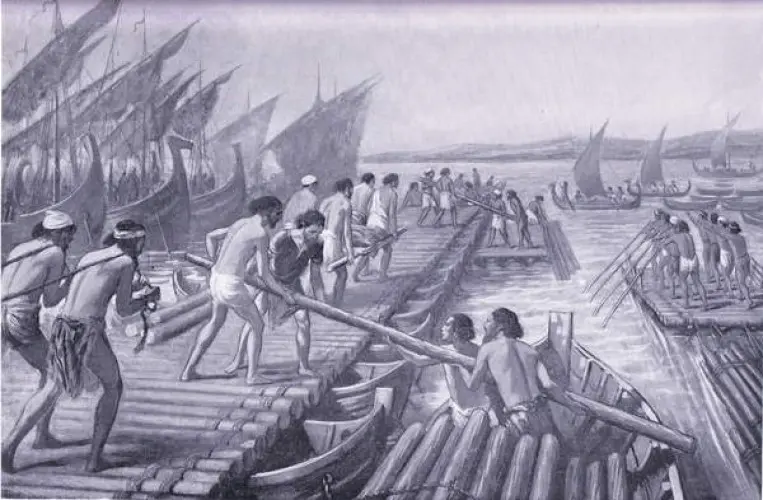Ἱστορίαι Ἡροδότου — ε’
Herodotus’ Histories — #5
May 2021
Phoenicians constructing Pontoon Bridges for Xerxes I of Persia during the second Persian invasion of Greece in 480 BC. (1915 drawing by A. C. Weatherstone).

In the fifth chapter, Herodotus tells us how the Persians and Phoenicians don’t tell the same story about the kidnapping of Io; the Phoenician claim that she wasn’t taken by force at all, but, rather, that she had sex with the ship-master and got pregnant through him. Fearing her parents and being ashamed, she leaves the ship.
Ὅυτω μὲν Πέρσαι λέγουσι γενέσθαι, καὶ διὰ τὴν Ἰλίου ἅλωσιν εὑρίσκουσι σφίσι ἐοῦσαν τὴν ἀρχήν τῆς ἔχθρης τῆς ἐς τοὺς Ἕλληνας. περὶ δὲ τῆς Ἰοῦς οὐκ ὁμολογέουσι Πέρσῃσι οὕτω Φοίνικες· οὐ γὰρ ἁρπαγῇ σφέας χρησαμένους λέγουσι ἀγαγεῖν αὐτήν ἐς Αἴγυπτον, ἀλλʼ ὡς ἐν τῷ Ἄργεϊ ἐμίσγετο τῷ ναυκλήρῳ τῆς νέος· ἐπεὶ δʼ ἔμαθε ἔγκυος ἐοῦσα, αἰδεομένη τοὺς τοκέας οὕτω δὴ ἐθελοντήν αὐτήν τοῖσι Φοίνιξι συνεκπλῶσαι, ὡς ἂν μὴ κατάδηλος γένηται. ταῦτα μέν νυν Πέρσαι τε καὶ Φοίνικες λέγουσι· ἐγὼ δὲ περὶ μὲν τούτων οὐκ ἔρχομαι ἐρέων ὡς οὕτω ἢ ἄλλως κως ταῦτα ἐγένετο, τὸν δὲ οἶδα αὐτὸς πρῶτον ὑπάρξαντα ἀδίκων ἔργων ἐς τοὺς Ἕλληνας, τοῦτον σημήνας προβήσομαι ἐς τὸ πρόσω τοῦ λόγου, ὁμοίως σμικρὰ καὶ μεγάλα ἄστεα ἀνθρώπων ἐπεξιών. τὰ γὰρ τὸ πάλαι μεγάλα ἦν, τὰ πολλὰ σμικρὰ αὐτῶν γέγονε· τὰ δὲ ἐπʼ ἐμεῦ ἦν μεγάλα, πρότερον ἦν σμικρά. τὴν ἀνθρωπηίην ὤν ἐπιστάμενος εὐδαιμονίην οὐδαμὰ ἐν τὠυτῷ μένουσαν, ἐπιμνήσομαι ἀμφοτέρων ὁμοίως.
Houtō men Persai legousi genesthai, kai dia tēn Iliou halōsin heuriskousi sphisi eousan tēn archēn tēs echthrēs tēs es tous Hellēnas. peri de tēs Ious ouk homologeousi Persēsi houtō Phoinikes; ou gar harpagē spheas chrēsamenous legousi agagein autēn es Aigypton, allʼ hōs en tō Argei emisgeto tō nauklērō tēs neos; epei dʼ emathe enkyos eousa, aideomenē tous tokeas houtō dē ethelontēn autēn toisi Phoinixi synekplōsai, hōs an mē katadēlos genētai. tauta men nyn Persai te kai Phoinikes legousi; egō de peri men toutōn ouk erchomai ereōn hōs houtō ē allōs kōs tauta egeneto, ton de oida autos prōton hyparxanta adikōn ergōn es tous Hellēnas, touton sēmēnas probēsomai es to prosō tou logou, homoiōs smikra kai megala astea anthrōpōn epexiōn. ta gar to palai megala ēn, ta polla smikra autōn gegone; ta de epʼ emeu ēn megala, proteron ēn smikra. tēn anthrōpēiēn ōn epistamenos eudaimoniēn oudama en tōutō menousan, epimnēsomai amphoterōn homoiōs.
This is the Persian account; and they believe that, through the capture of Troy (Ilium), their hatred towards the Greeks began. About the matter with Io, the Persian account does not agree with the Phoenician. They say that they did not bring her into Egypt by kidnapping her, but rather that she had sex with the ship-master in Argos. After she found out that she was pregnant and being ashamed her parents would find out, she sailed off with the Phoenicians, so that they might not find out. This, at any rate, is what the Persians and Phoenicians say. I will not say that things happened this or that way, but I shall attempt to point out to you the one who began the wrongdoings to the Greeks in the following pages of my story and write about both the great and small cities of men. Some of these, in the days of old, used to be large but a great many of them have turned small; and those that were great in my time once were small. Knowing that human happiness (prosperity) never stays in the same place, I shall write about both.